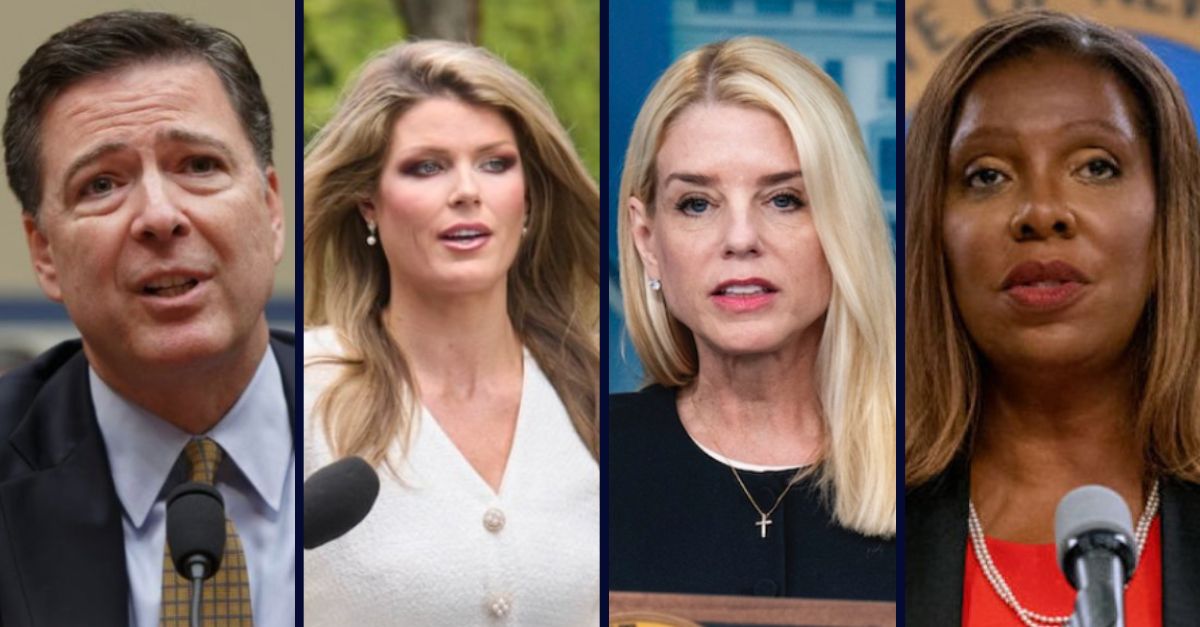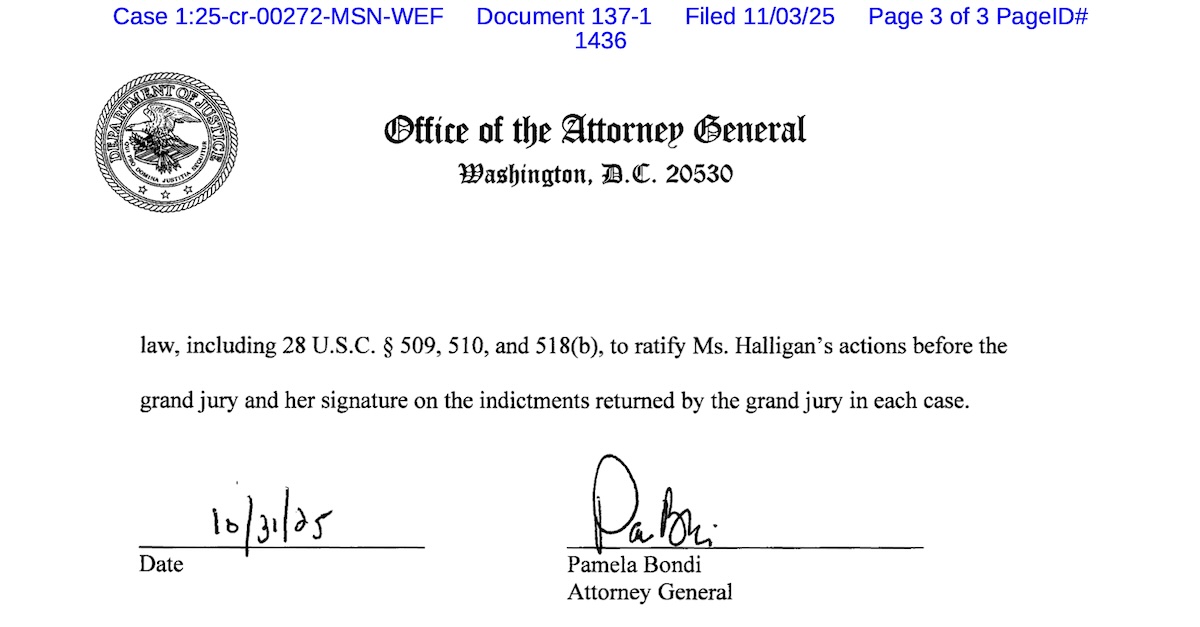
Left to right: FBI Director James Comey testifies on Capitol Hill in Washington before the House Oversight Committee to explain his agency's recommendation to not prosecute Hillary Clinton on July 7, 2016 (AP Photo/J. Scott Applewhite, File). Lindsey Halligan, special assistant to the president, speaks with a reporter outside of the White House, Wednesday, Aug. 20, 2025, in Washington. (AP Photo/Jacquelyn Martin). U.S. Attorney General Pam Bondi speaks at a press briefing with U.S. President Donald Trump in the James S. Brady Press Briefing Room in the White House in Washington, DC on Friday, June 27, 2025 (Annabelle Gordon/Sipa USA)(Sipa via AP Images). New York Attorney General Letitia James speaks during a press conference regarding former US President Donald Trump and his family's financial fraud case on September 21, 2022, in New York (photo by YUKI IWAMURA/AFP via Getty Images).
Ever since Lindsey Halligan was installed as interim U.S. Attorney for the Eastern District of Virginia in late September and promptly secured indictments of two high-profile rivals of President Donald Trump, her former client in private practice, questions have swirled about whether she was validly appointed. According to the DOJ, those questions are now legally irrelevant because of a memo U.S. Attorney General Pam Bondi signed on Halloween.
In a Monday court filing opposing ex-FBI Director James Comey and New York Attorney General Letitia James' motions to dismiss their charges, the DOJ — fresh off the third disqualification of an acting U.S. attorney — made the familiar argument that even if Halligan wasn't validly appointed on an interim basis, it doesn't matter.
Some context is necessary.
As Law&Crime has reported, three different federal judges have ruled that Bondi's acting appointments of Alina Habba in New Jersey, Sigal Chattah in Nevada, and Bilal "Bill" Essayli in California — appointments carried out when their 120-day interim U.S. attorney stints were set to expire — did not comply with the law. But in each of these cases, Bondi simultaneously appointed the prosecutors as special attorneys with supervisory powers over their offices.
While judges deemed Chattah and Habba unable to supervise their criminal defendant challengers' cases, there was a slightly different technical result for Essayli.
Perhaps no one put the maneuvering at play clearer than Essayli, as he told Glenn Beck in July, "We've got some tricks up our sleeves," when it appeared the expiration of his interim U.S. attorney stint might be curtains for him. It wasn't, not for months, and Essayli remains in a top role to the present day, able to supervise prosecutions as first assistant U.S. attorney but not as acting U.S. attorney.
As the Trump administration ramps up appeals of those adverse rulings, the DOJ has taken the sleight-of-hand to another level with Halligan.
Love true crime? Sign up for our newsletter, The Law&Crime Docket, to get the latest real-life crime stories delivered right to your inbox
Though Halligan was the lone signer of the Comey and James indictments, the possibility that her interim appointment is eventually adjudged "invalid" would not be a technical defect that should lead to the downfall of the prosecutions, the DOJ said. Why? Because Bondi had a backup plan to "ratify" Halligan's signature, more than a month after the interim appointment and just days ago.
"Even were Ms. Halligan's appointment invalid, the motions to dismiss should be denied. While Defendants challenge Ms. Halligan's appointment as interim U.S. Attorney, the actions they challenge do not hinge on her validly holding that particular office," the latest filing said, pointing to an attached Exhibit A. "Any government attorney can present a case to a grand jury or sign an indictment, and the Attorney General plainly possessed and exercised the authority to make Ms. Halligan a government attorney, as the Attorney General has now confirmed."
What is Exhibit A? An appointment order naming Halligan a special attorney to avoid any "doubt as to the validity" of the interim appointment, signed on Oct. 31 but applied retroactively to Sept. 22.

Bondi's special attorney appointment order for Lindsey Halligan was signed on Oct. 31 but applied retroactively to Sept. 22 (Exhibit A).
The order not only authorizes Halligan to "conduct and supervise the prosecutions" of Comey and James as a special attorney, it also claims to "ratify" her "actions before the grand jury and her signature on the indictments returned by the grand jury in each case."
As Bondi's counselor Henry Whitaker put it, now that the attorney general has "personally ratified the indictments to obviate any question as to their validity" and "cured any arguable flaw in Ms. Halligan's authority to prosecute," there's no credible Sept. 30, 2025, statute of limitations expiration argument available to Comey.
"Comey may respond that a ratifying principal must have been able to take that action 'at the time the ratification was made,' and the statute of limitations for his offenses (but not James') expired before the Attorney General's October 31 ratification order," the filing went on, explaining in detail the potential implications of Bondi's retroactive special attorney appointment order. "But when a timely filed indictment is 'dismissed for any reason after the period prescribed by the applicable statute of limitations has expired, a new indictment may be returned in the appropriate jurisdiction within six calendar months of the date of the dismissal of the indictment.'"
"Because the Attorney General could personally obtain a new indictment using that grace period, she may ratify Comey's existing indictment," the DOJ added.
Comments